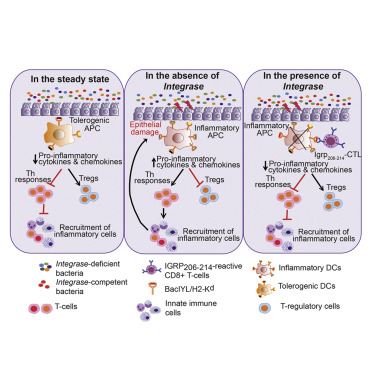Our official English website, www.x-mol.net, welcomes your
feedback! (Note: you will need to create a separate account there.)
A Gut Microbial Mimic that Hijacks Diabetogenic Autoreactivity to Suppress Colitis.
Cell ( IF 45.5 ) Pub Date : 2017-Oct-19 , DOI: 10.1016/j.cell.2017.09.022 Roopa Hebbandi Nanjundappa , Francesca Ronchi , Jinguo Wang , Xavier Clemente-Casares , Jun Yamanouchi , Channakeshava Sokke Umeshappa , Yang Yang , Jesús Blanco , Helena Bassolas-Molina , Azucena Salas , Hamza Khan , Robyn M. Slattery , Madeleine Wyss , Catherine Mooser , Andrew J. Macpherson , Laura K. Sycuro , Pau Serra , Derek M. McKay , Kathy D. McCoy , Pere Santamaria
Cell ( IF 45.5 ) Pub Date : 2017-Oct-19 , DOI: 10.1016/j.cell.2017.09.022 Roopa Hebbandi Nanjundappa , Francesca Ronchi , Jinguo Wang , Xavier Clemente-Casares , Jun Yamanouchi , Channakeshava Sokke Umeshappa , Yang Yang , Jesús Blanco , Helena Bassolas-Molina , Azucena Salas , Hamza Khan , Robyn M. Slattery , Madeleine Wyss , Catherine Mooser , Andrew J. Macpherson , Laura K. Sycuro , Pau Serra , Derek M. McKay , Kathy D. McCoy , Pere Santamaria

|
The gut microbiota contributes to the development of normal immunity but, when dysregulated, can promote autoimmunity through various non-antigen-specific effects on pathogenic and regulatory lymphocytes. Here, we show that an integrase expressed by several species of the gut microbial genus Bacteroides encodes a low-avidity mimotope of the pancreatic β cell autoantigen islet-specific glucose-6-phosphatase-catalytic-subunit-related protein (IGRP206-214). Studies in germ-free mice monocolonized with integrase-competent, integrase-deficient, and integrase-transgenic Bacteroides demonstrate that the microbial epitope promotes the recruitment of diabetogenic CD8+ T cells to the gut. There, these effectors suppress colitis by targeting microbial antigen-loaded, antigen-presenting cells in an integrin β7-, perforin-, and major histocompatibility complex class I-dependent manner. Like their murine counterparts, human peripheral blood T cells also recognize Bacteroides integrase. These data suggest that gut microbial antigen-specific cytotoxic T cells may have therapeutic value in inflammatory bowel disease and unearth molecular mimicry as a novel mechanism by which the gut microbiota can regulate normal immune homeostasis. PAPERCLIP.
中文翻译:

劫持糖尿病的自体反应抑制结肠炎的肠道微生物模拟物。
肠道菌群有助于正常免疫力的发展,但是当失调时,可以通过对病原性和调节性淋巴细胞的各种非抗原特异性作用来促进自身免疫。在这里,我们显示了由肠道菌属的几种细菌表达的整合酶编码了胰岛β细胞自身抗原胰岛特异性葡萄糖-6-磷酸酶催化亚基相关蛋白的低亲和力模拟表位(IGRP 206-214)。在对具有整合酶能力,整合酶缺陷和整合酶转基因拟杆菌的细菌进行克隆后,对无菌小鼠的研究表明,微生物表位促进了促糖尿病的CD8 + T细胞向肠道的募集。在那里,这些效应物通过以整联蛋白β7,穿孔素和主要组织相容性复合物I类依赖性方式靶向微生物负载抗原的抗原呈递细胞来抑制结肠炎。像它们的鼠对应物一样,人类外周血T细胞也识别拟杆菌整合酶。这些数据表明,肠道微生物抗原特异性细胞毒性T细胞可能在炎症性肠病和出土分子模拟中具有治疗价值,这是肠道微生物能够调节正常免疫稳态的新机制。回形针。
更新日期:2017-10-19
中文翻译:

劫持糖尿病的自体反应抑制结肠炎的肠道微生物模拟物。
肠道菌群有助于正常免疫力的发展,但是当失调时,可以通过对病原性和调节性淋巴细胞的各种非抗原特异性作用来促进自身免疫。在这里,我们显示了由肠道菌属的几种细菌表达的整合酶编码了胰岛β细胞自身抗原胰岛特异性葡萄糖-6-磷酸酶催化亚基相关蛋白的低亲和力模拟表位(IGRP 206-214)。在对具有整合酶能力,整合酶缺陷和整合酶转基因拟杆菌的细菌进行克隆后,对无菌小鼠的研究表明,微生物表位促进了促糖尿病的CD8 + T细胞向肠道的募集。在那里,这些效应物通过以整联蛋白β7,穿孔素和主要组织相容性复合物I类依赖性方式靶向微生物负载抗原的抗原呈递细胞来抑制结肠炎。像它们的鼠对应物一样,人类外周血T细胞也识别拟杆菌整合酶。这些数据表明,肠道微生物抗原特异性细胞毒性T细胞可能在炎症性肠病和出土分子模拟中具有治疗价值,这是肠道微生物能够调节正常免疫稳态的新机制。回形针。









































 京公网安备 11010802027423号
京公网安备 11010802027423号